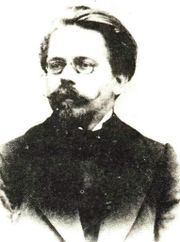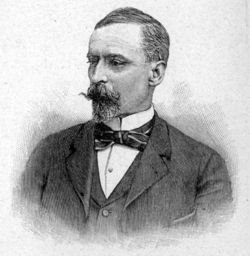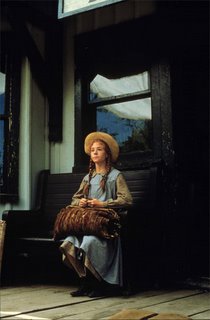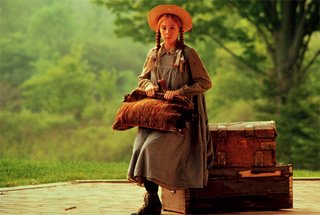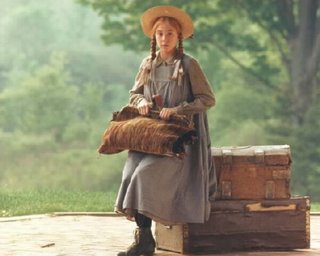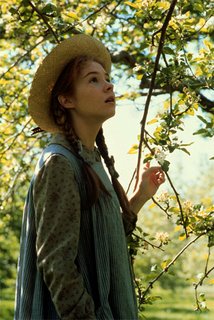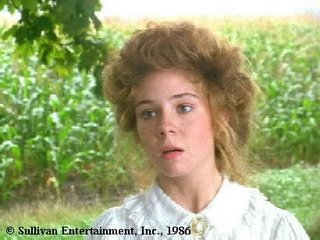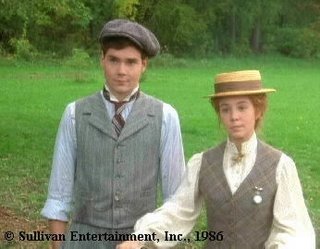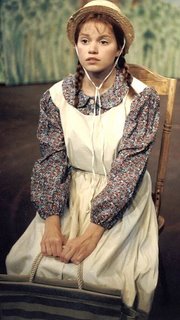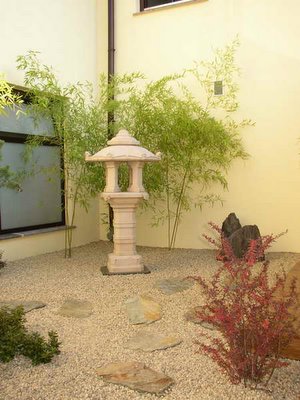time to resume my blog...
Hello:)
Famous Polish writer Stanislaw Lem has died today:(
It is his www.site:
http://www.lem.pl/
By the way I would like to present to you biographies of three other famous Polish writers Władysław Reymont (Nobel winner), Henryk Sienkiewicz (another Nobel winner) and Boleslaw Prus, moreover you can read here a biography of the biggest Polish poet -Adam Mickiewicz.
Maybe you have met somewhere their works.... or will meet...who knows...
WŁADYSŁAW STANISŁAW REYMONT
7 May 1867- 5 December 1925
The baptism certificate of the future author of Chłopi ("Peasants") indicates that his real surname was Rejment. The change was "ordered" by himself during his debut, as it was supposed to protect him in the Russian-annexed area from any trouble for having published in Galicia a work which would not be allowed under the Tsar’s censorship. Kazimierz Wyka, an enthusiast of Reymont’s work, surmises that the correction could have been meant also to wipe out any association with the word rejmentować which in Polish local dialects means "to swear".
He was born in the village of Kobiele Wielkie, near Radomsko as one of nine children of Józef Rejment, an organist. He spent his childhood in Tuszyn near Łódż, after his father moved there to work in a richer parish. He was defiantly stubborn, so after a few years of education in the local school he was sent by his father to Warsaw into the care of his eldest sister and her husband to teach him his vocation. In 1885, after passing his examinations and presenting "a tail-coat, well-made", he was given the title of journeyman tailor - the only formal certificate of his education.
To his family’s annoyance, he did not work a single day in this profession. He ran away to a travelling theatre playing in the province, and in the summer in the "garden theatres" of Warsaw. Without a penny to his name he returned to Tuszyn after a year and, thanks to his father’s connections, took up the post of a gateman at a railway crossing near Koluszki for 16 roubles a month. He escaped twice more: in 1888 to Paris and London as a medium with a German spiritualist, and then again to a theatre troupe. After his lack of success (he was not a talented actor), he returned (his longest stay was in Krosnowa near Lipce village) and thought of various projects, e.g. joining the Pauline Order in Częstochowa.
When his Korespondencje ("Correspondence") from Rogowo, Koluszki and Skierniewice was accepted for publication by Głos ("The Voice") in Warsaw in 1892, he gave up his job. He went to Warsaw with a few roubles in his pocket and a packet of short stories. With a sense of enterprise so characteristic of him and the ability to understand others, he visited the editorial offices of various newspapers and magazines and met writers who became interested in his inborn talent. On A. Świętochowski’s advice, he went on a pilgrimage to Częstochowa in 1894 with a crowd of pilgrims and wrote a report about it, seen even today as a classic example of reportage.
Together with this work, he sent his short stories over to different magazines, and encouraged by good criticism decided to write novels - Komediantka ("The Deceiver") (1895) and Fermenty ("Ferments") (1896). No longer poor, he satisfied his passion for travel. He visited Berlin, London, Paris, Italy. Then, he spent a few months in Łódź collecting material for a new novel ordered by the Kurier Codzienny ("The Daily Courier") from Warsaw. The earnings from this book - Ziemia obiecana ("The Promised Land") (1897) enabled him to go on his next trip to France, where he mostly met Polish people (Jan Lorentowicz, Żeromski, Przybyszewski, Rydel, etc.). His earnings did not allow for that kind of life of travel, however in 1900 he was awarded 40,000 roubles in compensation from the Warsaw-Vienna Railway after an accident in which Reymont, as a passenger, was severely injured. During the treatment he was looked after by Aurelia Szacnajder Szabłowska, whom he married in 1902, having first paid for the annulment of her earlier marriage. Thanks to her discipline, he restrained his travel-mania somewhat, but never gave up either his stays in France (where until 1908 he was working on Chłopi which he had begun in 1901) or in Zakopane, or his journey to the USA in 1919 at the Polish government’s expense and his stay among the Polish people there. Despite his ambitions to become a landowner (an unsuccessful attempt to manage an estate bought in 1912 near Sieradz), it was not for him. He bought a village Kołaczkowo near Poznań in 1920, but spent his winters in Warsaw or in France.
In November 1924 he was awarded the Nobel Prize for Literature. His rivals were T. Mann, M. Gorki and T. Hardy. Polish public opinion counted on the award for Żeromski, but the prize for the author of Chłopi was welcomed as an appropraite decision as well. He could not take part in the ceremony in Sweden due to his heart illness. The certificate and a cheque for 116,718 Swedish kroner were sent to France where he was being treated. In 1925, when his heart recovered somewhat, he went to a farmers’ meeting in Wierzchosławice near Kraków, where Wincenty Witos welcomed him as a member of PSL "Piast" (the Polish Peasant Party) and praised his writing skills. Soon after that event, Reymont’s health deteriorated. He died in Warsaw and was buried in the Powązki Cemetery. The urn with his heart was laid in one of the pillars of the Holy Cross Church.
Reymont’s literary output includes about 30 extensive volumes of prose. There are works of reportage: Pielgrzymka do Jasnej Góry ("Pilgrimage to Jasna Góra") (1894), Z ziemi chełmskiej ("From the Chełm Lands") (1910 - about the persecutions of the Uniates), Z konstytucyjnych dni ("From the Days of the Constitution") (about the revolution of 1905) and some sketches from the collection Za frontem ("Beyond the Front") (1919). There are numerous short stories on life in the theatre, village life or work on the railway: Śmierć ("Death") (1893), Suka ("Bitch") (1894), Przy robocie ("At Work") and W porębie ("In the Clearing") (1895), Tomek Baran (1897), Sprawiedliwie ("Justly") (1899) and a sketch for a novel Marzyciel ("Dreamer") (1908). Then there are the novels: Komediantka, Fermenty, Ziemia obiecana, Chłopi, Wampir ("The Vampire") (1911), which was sceptically received by the critics, and a trilogy written in the years 1911-1917: Rok 1794 ("1794") (Ostatni Sejm Rzeczypospolitej, Nil desperandum and Insurekcja) ("The Last Parliament of the Commonwealth", "Nil desperandum" and "Insurrection"). The critics admit a certain number of similarities between this writing and the writings of the Naturalists, but they stress that it was not a "borrowed" Naturalism, but a record of life as experienced by the writer himself. Moreover, Reymont never formulated any aesthetics of his writing. In that, he was just like other self-taught geniuses, such as Mikołaj Rej or Aleksander Fredro. With no philosophical education and not being able to read in foreign languages, he avoided any statements that could incline anyone to accuse him of incompetence. He realised that his knowledge of reality was his strong point, not the theory of literature. His ability to remember details was often humorously tested, and he always won. In all his great works the essence of life was head and shoulders above the ideological ambitions of his advisers (like the political leaders of the National Democracy party).
Komendiantka creates the picture of the drama of a rebellious girl from the provinces, who, in a travelling theatre troupe, instead of asylum from the lies of her own surroundings, finds a nest of intrigues and sham. In Fermenty, a sequel to Komediantka, the heroine, rescued after an unsuccessful attempt to kill herself, returns to her family and accepts the burden of existence. Aware of the fact that dreams and ideas do not come true, she marries a nouveau riche who is in love with her. Ziemia obiecana, next to Chłopi Reymont’s best novel, is a social panorama of Łódź, full of drastic detail, presented as an arena of the struggle for survival. The success of some means trampling on others. The city destroys those who accept the rules of the rat race, as well as those who do not. The moral gangrene affects equally Germans, Jews and Poles. This dark vision of cynicism, the bestial qualities of men and the law of the jungle, where ethics, noble ideas and holy feelings turn against those who believe in them, are, as the author intended, at the same time a denunciation of industrialisation and urbanisation.
Ziemia obiecana was translated into 15 languages and had two film adaptations; one directed in 1927 by A.Węgierski and A. Hertz and the other in 1975 by A. Wajda.
In Chłopi, an unquestionable masterpiece, Reymont created a more complete and suggestive picture of country life than any other Polish writer. The novel impresses the reader with its authenticity of the material reality, customs, behaviour and spiritual culture of the people. It is even more authentic in that it is written in the local dialect. Not only did Reymont use dialect in dialogues but also in narration, creating a kind of a universal language of Polish peasants. Thanks to this, he presents the colourful reality of the "spoken" culture of the people better than any other author. He set the action of the novel in Lipce, a real village which he came to know during his work on the railway near Skierniewice, and restricted the time of events to ten months in the unspecified "now" of the nineteenth century. It is not history that determines the rhythm of country life, but the "unspecified time" of eternal returns. The composition of the novel astonishes the reader with its strict simplicity and functionality. What is easier than writing a novel about village life, restricting its plot to one year and one place? The titles of the various volumes signal a tetralogy in one vegetational cycle, which regulates the eternal and repeatable rhythm of village life. Parallel to that rhythm is a calendar of religion and customs, which is also repeatable. In such boundaries Reymont placed a colourful country community with clearly drawn individuals. They take part in a complicated arrangement of mutual interaction and in unexpected turns of events. The repertoire of human experience and the richness of spiritual life, which can be compared with the repertoire of Biblical books and Greek myths, has nothing of doctrinal ideas or didactic exemplification. The author of Chłopi does not believe in doctrines or sophisticated talking, but in his own knowledge of life, the mentality of the people described and his sense of reality. It is easy to point to moments of Naturalism (e.g. some erotic elements) or to illustrative motives characteristic of Symbolism. It is equally easy to prove the Realistic values of the novel. None of the "isms" however, would be enough to describe the novel, as the feature of masterpieces is the ability to escape from "isms".
The novel was filmed twice (directed by E. Modzelewski in 1922 and by J. Rybkowski in 1973) and translated into 27 languages.
HENRYK SIENKIEWICZ
5 May 1845 - 15 November 1916
As research into readers and books has confirmed, Sienkiewicz has been the most popular novelist for over one hundred years in Poland, and is the most popular Polish author in the world. His works are still printed in large numbers, and Quo vadis was translated into 40 languages. Most of his novels were also "translated" into scripts and filmed.
He was born in Wola Okrzejska, a village in Podlasie, to an impoverished noble family, on his father’s side deriving from the Tartars who had settled in Lithuania in the fifteenth and sixteenth centuries. After graduating from grammar school he studied at the Philological Faculty of the Warsaw Central School. He was poor and dreamt of a career in writing. His debut took place in 1869, when he was still a student, in Przegląd Tygodniowy ("The Weekly Review"). Having finished his studies, with some of his works already printed, in 1873 he became the person responsible for a regular series of feature articles Bez tytułu ("Without a Title") in "Gazeta Polska" ("The Polish Gazette"), and in 1875 the series Chwila obecna ("The Present Moment"). From 1874 he was in charge of the literary department in "Niwa" and worked on a trilogy of short stories, Stary sługa ("The Old Servant"), Hania and Selim Mirza, which he finished in 1876.
He married Maria Szetkiewiczówna from Lithuania in 1881. They had some happy years together, but in 1885 she died of tuberculosis. They had two children. In 1893 he married Maria Wołodkowiczówna from Odessa; this marriage, however, finished in 1895 in divorce at her motion. In 1904 Sienkiewicz married Maria Babska, whom he had known since 1888.
From 1875 he travelled widely. Travel was for him a way of life and the condition of creativity as he became accustomed to writing "on the road"; in motels and hotels, and he was one of the most hard-working writers of the epoch (his works, edited by J. Krzyżanowski between 1948 and 1955, appeared in 60 volumes). He started travelling on a large scale between 1876 and 1878, when he went to the USA on a trip paid for by "Gazeta Polska". He toured California (San Francisco, Anheim, Los Angeles) for nearly three years and sent to "Gazeta" his Listy z podróży ("Letters From a Journey") and short stories. After his return to Europe he stayed in Paris, then in January 1879 went to Lwów and from there to Huculszczyzna and Tarnopol, to Szczawnica and Krynica, later to Venice and Rome, and finally came back to Warsaw in the autumn. Every year he would change the places in which he stayed at least a few times. For example, after having finished Potop ("The Deluge") in 1887, and this was not an exceptional year, in January he went from Kraków to Warsaw, in February to Lithuania to hunt, in March again to Kraków, then to Vienna, Abbacia on the Adriatic Sea, where he started writing Pan Wołodyjowski ("Colonel Wołodyjowski"). In May he was treated in a spa in Kaltenleutgeben near Vienna, where he continued to write, then in Brussels and Ostende, from where he travelled to England and France, in September to Gastein and to Kaltenleutgeben and Vienna again, he returned to Warsaw in November just to leave for Kraków, Tarnów and Zakopane after just a few weeks. He spent a lot of time in Italy, Switzerland and France, and he happily travelled to the castles around Poland, to Nałęczów and different spas in Galicia, but he also travelled along less frequented paths (in 1886 to Romania, Bulgaria, Turkey and Greece, in 1891 to Egypt and Zanzibar). He did not change that style of life even after he had received a palace and an estate in Oblęgork near Kielce in 1900, a gift from his readers. He would rather visit a place than settle there. Since he had become the object of a cult, he was invited to various celebrations, congresses and balls, especially those sponsored by conservative circles, and he never declined an invitation. This increased even further after he was awarded the Nobel Prize for Literature in 1905.
After the First World War broke out he left Oblęgork and moved away from the conflict zone. He settled in Switzerland, where he was in charge of a committee to assist Polish victims of the war and gathered in a short time about 20 million Austrian kroner. After his death in Vevey he was buried in the local Catholic church then, in 1924, his body was brought to Warsaw and buried in the vaults of St John’s Cathedral.
He achieved not only prestige and fame during his lifetime, but also financial success. After writing his trilogy, he became the best paid Polish writer (he received 70,000 roubles from the publisher for the right to reissue it over 20 years). When in 1888 an unknown fan donated 15,000 roubles to him, Sienkiewicz opened a scholarship fund in the name of his deceased wife, designed for artists suffering or endangered from tuberculosis. Konopnicka, Wyspiański and Tetmajer were granted its help. The value of Oblęgorek was around 70,000 roubles, the Nobel Prize brought him another 100,000 roubles in 1905.
He started as a writer of Positivism. His feature articles, letters from America, Humoreski z teki Worszyłły (1872), and later Szkice węglem (1877), Janko Muzykant and Z pamiętnika poznańskiego nauczyciela (1879), Za chlebem (1880) i Bartek Zwycięzca (1882) are evidence of his ideological membership of the advocates of organic work, of his criticism of the conservatism of the nobility and of his strong disapproval of the landowners for turning their backs on the peasants. However, unlike some Positivist idealists, he did not have a tendency to idealise the people. His writing was not in accordance with the Positivist standards of being biased. In his trilogy of short stories the theme of the genre dominates, and in such American stories as Latarnik (1881), Wspomnienie z Maripozy (1882) or Sachem (1883), the theme of patriotism, neglected by the Positivists at the time of the defeat of the January Uprising, can be easily seen. Ogniem i mieczem ("With Fire and Sword"), published in episodes from 2 May 1883 to 1 February 1884 and accepted by the audience with growing enthusiasm, proved that Sienkiewicz changed his views. Here, he turned away from contemporary subjects towards history. It is the history of the Polish-Ukrainian conflict in the first half of the seventeenth century. With this novel he renews a lesson of military patriotism criticised by the Positivists and refers to those traditions which said that the nobility was the power of the country. The sequels of this multi-volume series about the seventeenth century (about the war with Sweden and the battles on the Polish-Turkish border), which was published simultaneously in all three annexed areas, Potop ("The Deluge") and Pan Wołodyjowski ("Colonel Wołodyjowski") (1884-1888), ensured Sienkiewicz’s fame as a favourite of the audience, and his later historical novels; Quo vadis (1895-96), about the beginnings of Christianity in Ancient Rome and Krzyżacy ("The Teutonic Knights") (1897-1900), about the times of Queen Jadwiga and Jagiełło and the origin of the Polish-Lithuanian victory over the Teutonic Knights at Grunwald, only strengthened that fame. Even the less successful contemporary novels Bez dogmatu ("Without Dogma") (1889-90), and Rodzina Połanieckich ("The Polaniecki Family") (1893-94), or the not quite as successful historical novels, such as Na polu chwały ("On the Field of Glory") (1903-5), about King Jan III Sobieski’s rescued Vienna in 1683, or Legiony ("Legions") (1914), about the first post-partition attempts to organise the struggle to regain independence, were unable to weaken his popularity.
In his historical novels Sienkiewicz followed and colourfully and impressively used various traditions. He overtook Walter Scott’s idea of putting the characters and fictional plots (love, adventure) in the foreground of the story, and real historic events (real wars, real characters; rulers, warriors, officials) in the background. He owed his colourful characters, pathos and optimistic overtones of the events to the tradition of the epic poem from Homer to Pan Tadeusz. From the messianic beliefs of Old Poland and Romanticism, he took the idea of Providence watching over the course of history. He often borrowed from Romantic stories, especially as far as the style was concerned, the style which up to this day is praised as one of the outstanding features of Sienkiewicz’s artistry. The older Dumas taught him how to present the speed of the action and create the tensions of the adventures. In such ways the historical works of Sienkiewicz superbly refreshed the repertoire of such motifs as rivalries, duels, ambushes, kidnappings, partings, tricks, unexpected rescues, escapes, pursuits, disguises, fortune telling, etc. At the end of the Trilogy, Sienkiewicz stressed that it was written to raise the spirit of the nation. This was, however, expressed through putting the importance of heroic deeds above work or education as well as the subjectivity of opinion about "us" and "them". "Us", i.e. Polish and Catholic knights, although not without sin and sometimes weak, definitely outdo other nations and religions. Facing the Muslim (Turkish, Tartar) East, they act as a bastion of Christianity. Sienkiewicz put Polish Catholic religiousness and military tradition in the foreground of raising the spirits and hopes for the future.
The unusual popularity of the author of the Trilogy and Quo vadis had from the very beginning been accompanied by a duality of opinion within the environment of the critics, writers and researchers into literature. His supporters, from Stanisław Tarnowski in the nineteenth century to Julian Krzyżanowski in the second half of the twentieth century, cite the popularity opinion polls, patriotic arguments and artistry. His opponents, however, question the ideological and intellectual value of his works, talk about the "whitewashing" of the nobility and other false pictures of society, the one-sidedness of educational issues, the lack of psychological depth and helplessness towards philosophical themes, so important for a modern man. They also point to an extensive use of literary stereotypes. They are willing to call Sienkiewicz "the first-class writer of the second class". These critics include Bolesław Prus, Aleksander Świętochowski, Stanisław Brzozowski, Witold Gombrowicz and Czesław Miłosz.
BOLESŁAW PRUS
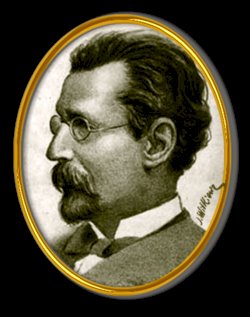
20 August 1847 – 19 May 1912
His real name was Aleksander Głowacki. He replaced it with a pen-name created from the name of his family’s coat of arms. In his youth the writer saw his future connected with science, thus he treated his first humorous pieces for the newspapers as a not too ambitious piece of paid work which, as he himself thought, fitted the heraldic relics of the nobility. Only serious works were signed with the name Głowacki. Later on, when he decided that his literary works were as useful as his scientific research, the writer did not want to confuse his audience and continued writing as Prus.
He was born in Hrubieszów in the area of Lublin to the family of a manager of private landed estates. His mother passed away when he was only three, his father, in turn, died around 1856. He went to Puławy into his grandmother’s care and after her death an aunt from Lublin took him in. He went to a primary school in Lublin, and from 1862 to a grammar school in Siedlce. After that he studied in Kielce, taught by his elder brother, Leon Głowacki, a history teacher. In 1863 he escaped to a partisan unit. Wounded in a skirmish near Siedlce, he was arrested by the Russians. As he was under-age, he was allowed to go to his family to Lublin after treatment at the hospital. However, he was arrested again in 1864. Released after three months, he joined a secondary school in Lublin. He graduated in 1868 and was accepted by the Mathematics and Physics Faculty of the Central School in Warsaw.
As a result of an emotional crisis, and probably his bad financial situation as well, after his second year Głowacki gave up his studies and transferred to a school specialising in agriculture and forestry to Puławy. But, as he never stayed anywhere long, once again he left for Warsaw and took up various jobs (e.g. he was a manual worker in a metallurgical company). Among these jobs there was some literary activity as well. He co-operated with "Opiekun Domowy" ("House-keeper") and "Niwa" as a feature-article writer from 1872, from 1873 with the humorous publication "Mucha" ("Fly"), and from 1874 with "Kolce" ("Thorns"), but he still dreamt of a future in science or in an occupation more practical than literature. "Kurier Warszawski" ("The Warsaw Courier") started a weekly chronicle in 1875. It ensured him a living, albeit a modest one. This is when he married. His chosen was his cousin Oktawia Trembińska. The stabilisation of this childless marriage was only seemingly a life of no events, but in reality it was full of lasting affection, mutual help, intense work and an abundance of impressions, although without any sensational overtones. Prus avoided the "high life". He did not like appearing during grand spectacles. He avoided long distance travel and broad views due to his agoraphobia. From his few trips to the mountains (to Zakopane in 1881 and 1889, and to Wisła in 1900) as well as abroad (to Vienna in 1881 and Germany, Switzerland and Paris in 1895), Prus brought back memories of nervousness and embarrassment, alongside original observations. He preferred the paths of Nałęczów (where he spent most of his summer holidays), the shelter of his Warsaw apartment and intimate conversations among friends.
He died in Warsaw and was buried in the Powązki Cemetery.
Having started work for "Kurier Warszawski", Prus became a professional journalist. Until 1887, he published in this newspaper 345 weekly feature articles. After transferring to the "Kurier Codzienny" ("The Daily Courier") in 1887, he published 373 feature articles until 1901. From 1905 to 1911, he wrote 178 chronicles for the "Tygodnik Ilustrowany" ("The Illustrated Weekly"). If we add similar texts published in other papers, the total balance of his feature work was over 1100 chronicles. They are enlivened by a Positivist trust (in the spirit of Mill) in utilitarianism and a Spencerian theory of society as an organism. Out of this, Prus derived a postulate of mutual help between individuals and social classes as well as a compulsory exchange of services, claiming that Darwin’s rule of the struggle for existence cannot be the only regulation of community life. He proved that it was not Messianic usurpation, but utility and the progress of civilisation that could bring independence to Poland. In the unequivocal opinion of critics and literary historians, his feature writing is a classic example of the genre. It astonishes readers with its abundance of observations, variety of atmosphere, inventiveness of humorous and stylistic "spices". The later masters of the genre, e.g. Antoni Słonimski, referred to it. Between 1953 and 1970 his work was published in a 21-volume edition, with a critical foreword by Z. Szweykowski.
The second section of Prus’s work, highly esteemed both by contemporaries and by posterity, is the short narrative form. It consists of 110 works. There are humorous sketches written in Prus’s youth, picturesque pieces like Na wakacjach (1884), short stories: Antek, Katarynka, Michałko (1880), Kamizelka (1882), Z legend dawnego Egiptu (1888) and Sen (1890). There are also longer stories and novel sketches such as Sieroca dola (1877), Przygoda Stasia (1879), Powracająca fala (1880), Grzechy dzieciństwa (1883) and Omyłka (1884). The main feature of these works is the psychologically deep picture of children and seemingly insignificant heroes in social conditions Their adventures do not fit within the adventurous tradition and do not surprise with any "unusual events", but draw our attention by their micro-sociological content, moral problems, subtlety of the inner life portrait, suggestiveness of parables and careful construction.
His novels are: Placówka (1886), Lalka (1889), Emancypantki (1893), Faraon (1896) and Dzieci (1908). They were preceded by Anielka (1880), related to his short stories through its theme, and followed by the unfinished Przemiany (1912). The novel manifesto of Prus, specified in 1884 in his review of Ogniem i mieczem ("With Fire and Sword"), was in opposition to the nation-uplifting intentions of Sienkiewicz, to his effects of romance and adventure and to turning away from the urgent problems of the present day. He adhered to the realist rule of observation (approving of Taine’s aesthetics), strove for modern composition (for many years he made notes on this subject as he planned to write a work about it), thought about the balance between the Romantic idealisation of life and the Naturalistic courage to enter the domain of evil. (He only warned against falling into the … pigsty in all that Naturalistic momentum.) As he put it himself, he decided to write a novel about the "great questions of our epoch" after long literary "training".
The first of the questions, already formulated in the short story Omyłka, concerned the attitude towards the tradition of uprisings. The answer came out against the Romantic apotheosis of armed struggle. In Placówka it was the issue of the peasantry. Prus opposed Sienkiewicz’s military patriotism and cult of the past with the vision of a Poland no longer dependent on the nobility; the descendants of the knights utilise their ancestors’ tradition during a masquerade, and sell their homeland to Germans. The land owners are not Poland’s chance, it is the peasants who atavistically stay faithful to their homeland. It is they, who, despite their conservatism and lack of modernity, are the salt of the earth and the crew of the national institution, and not the great-grandchildren of the victors over the Cossack.
Lalka ("The Doll") today regarded as one of the masterpieces of Polish literature and placed amongst the best works of European Realism, constitutes a panorama of life in Warsaw between 1878 and 1879, and at the same time is a subtle story of three generations of Polish idealists, their psychological complications, their involvement in the history of the nineteenth century, social dramas, moral problems and the experience of tragic existence. At the same time this story describes the disintegration of social relationships and the growing separation of a society whose aristocratic elite spreads the models of vanity and idleness. In the bad air of a backward country, anti-Semitic ideas are born, valuable individuals meet obstacles on their way, and scoundrels are successful. Although full of humorous pictures, Lalka is one of the most pessimistic of Polish novels.
Emancypantki ("Emancipated Women"), in turn, is an analysis of women’s issues and an attempt to cross over from Positivistic scientism towards metaphysics. It is easy to see on the surface of the popular plot a satire on the behaviour of noisy feminists and a warning against the neglect of maternal duties. It is in reality, however, a novel about the complexity of female spiritual needs.
In Faraon ("Pharaoh"), an unexpected novel, as Prus declared himself an enthusiast of modern themes, the reader is given a historiosophic novel of the history of ancient Egypt. It is usually stressed that this is a penetrating novel about the health of the country and the mechanisms of a power struggle. But at the same time Faraon is a novel about the role of civilisation, science and religion and the function of the "castes" nursing them. It can only be added that it is the only European philosophical novel about a country.
Positivist critics reacted to the novel-writing of Prus, especially Lalka, with distaste. They saw too many compositional faults and not enough truth about people in what was not in accordance with the then current standards of Realism. Now, the critics, not only Polish ones, see these discrepancies as signs of innovation. Most translations of Lalka and Faraon appeared after the Second World War. During the same half a century most stage and film adaptations took place. It is obvious that throughout the years the interest in Prus has increased and new values of his works have been discovered.
ADAM MICKIEWICZ
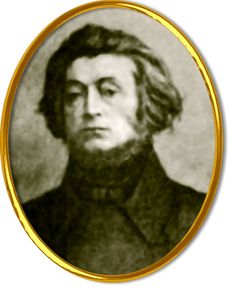 Born on 24 December 1798 in Zaosie near Nowogródek or in Nowogródek itself. He was baptised on 12 February 1799 and given the names Adam Bernard. He came from a family of low nobility. His father, Mikołaj, was an attorney in Nowogródek, and his mother, Barbara (née Majewska) was the daughter of a steward from Czombrów. In 1807 he commenced his education in the district school in Nowogródek, which was run by the Dominicans. His first poetic attempts came from this period. On 16 May 1812 the poet’s father died, which brought about a deterioration in the family’s material conditions. In the summer of the same year Napoleon’s troops, heading for Moscow, marched into Lithuania. Nowogródek hosted Hieronim, the Westphalian king. The citizens celebrated the emperor’s birthday with due ceremony. A few months later Mickiewicz observed the retreat of the remnants of the Grand Army. A field hospital was organised in the Dominican school which he used to attend.
Born on 24 December 1798 in Zaosie near Nowogródek or in Nowogródek itself. He was baptised on 12 February 1799 and given the names Adam Bernard. He came from a family of low nobility. His father, Mikołaj, was an attorney in Nowogródek, and his mother, Barbara (née Majewska) was the daughter of a steward from Czombrów. In 1807 he commenced his education in the district school in Nowogródek, which was run by the Dominicans. His first poetic attempts came from this period. On 16 May 1812 the poet’s father died, which brought about a deterioration in the family’s material conditions. In the summer of the same year Napoleon’s troops, heading for Moscow, marched into Lithuania. Nowogródek hosted Hieronim, the Westphalian king. The citizens celebrated the emperor’s birthday with due ceremony. A few months later Mickiewicz observed the retreat of the remnants of the Grand Army. A field hospital was organised in the Dominican school which he used to attend.
In 1815 he left for Wilno where he entered the university which at that time was an important centre of Enlightenment culture in Lithuania. He studied at the Physics and Mathematics Faculty. He also attended lectures at the Faculties of Moral and Political Studies and Literature and Liberal Arts. He simultaneously applied for admission to the Teachers’ Seminary which was also at the university. Because of his material situation he also applied for a state scholarship which was awarded to candidates preparing for the profession of teacher. After graduation he would have to work off the scholarship by teaching in a school appointed by the university. He was one of the founders of the secret society, Towarzystwo Filomatów (Philomats’ Society) (1817). Its aim was self-educational and scientific work, but also the patriotic upbringing and education of university youth. "Tygodnik Wileński" (1818, VI, pp. 254-256) published Mickiewicz’s first printed poem: Zima Miejska. In 1819 he graduated from university with an MA degree. He received a good humanistic education in the fields of classical philology, history, the theory of poetry and pronunciation. He was sent to a district school in Kowno (1819-1823). In 1822 the first volume of Poezyje (including Ballady i romanse), which was dedicated to his friends, was published in Wilno. The novelty of this collection meant that the year 1822 is considered as the breakthrough of Romanticism in Poland. One year later Mickiewicz published his second volume of Poezyje. It included Grażyna and Dziady II and IV (Parts II and IV of "Forefathers’ Eve").
In July 1823 in Vilnius an investigation into secret youth unions in Lithuania was commenced. On the night of 4/5 November 1823 Mickiewicz was arrested. He was imprisoned in a Basilian monastery until 1824. He was sentenced for "the spread of unreasonable Polish nationalism through teaching" to working as a teacher in "provinces remote from Poland" and left Poland in the autumn of 1824.
His five-year stay in Russia played an important role in Mickiewicz’s life. At first he briefly stayed at Petersburg, then in Odessa, from where he travelled in 1825 to the Crimea, which resulted in the publication of Sonety krymskie ("Sonnets from the Crimea"). From December 1825 until April 1828 he lived in Moscow, where he was formally employed in the office of the governor-general. He entered the environment of the intellectual and social élites in Moscow and Petersburg. He achieved the fame of a Romantic poet; his improvisations evoked general admiration in the salons. He met Russian poets, Pushkin among others; he made friends with some Decembrists (K. Rylejew, A. Biestuzew). In his later works he would use the knowledge which he gained here about the Russian Empire and the tsar’s despotism. In 1826 he published Sonety ("Sonnets") in Moscow, then in 1828 Konrad Wallenrod ("Konrad Wallenrod") in Petersburg. He spent the last year of his stay in Russia in Petersburg. In May 1829 he received a passport thanks to the help of Russian friends and left Russia on an English steamboat heading for Hamburg.
He travelled around Europe: in Berlin he listened to Hegel’s lectures, in Weimar he met Goethe, in Bonn A.W. Schlegel, in Bohemia - V. Hanka. He also visited Switzerland and Italy. When in Rome he learned about the outbreak of a November uprising (1830/1831) in Warsaw. He did not take part in it although he set off for his country with a false passport. He reached only Wielkopolska.
In March 1832 he went to Dresden. There he wrote the third part of Dziady ("Forefathers’ Eve" III) (published in Paris 1832), and fragments of translations from Byron. In July he left for Paris where, apart from brief intervals, he would spend the rest of his life. At the beginning he became involved in the work of émigré groups. He became a member of the Literary Society and the Lithuanian and Russian Lands Society; in 1833 he was the editor and main journalist of "Pielgrzym Polski" ("Polish Pilgrim"). He included his thoughts on Poland’s mission and the tasks facing the émigrés in Księgi narodu polskiego i pielgrzymstwa polskiego ("Books of the Polish Nation and its Pilgrimage") (1832).
Mickiewicz, disappointed in his hopes for an early political coup d’état in Europe and disheartened by "the hellish arguments" among the émigrés, separated himself from public life. He then went through a period of a deepening of religious life, he read mystical writers: Boehme, Saint-Martin.
In 1834 he married Celina Szymanowska. Mickiewicz did not have any regular income, and setting up a family worsened his financial situation, which was already bad enough (in 1835-1850 his six children were born). From November 1839 he lectured in Latin literature at the Lausanne Academy. He abandoned, however, his lecturing activity in the autumn of 1840 in order to take up the Chair of Slavic literature at the Collège de France. His Parisian lectures aroused lively interest, and not only among Polish émigrés. His audience also included Russians, Italians, Czechs and Frenchmen (J. Michelet, E. Quinet, George Sand), among others.
In July 1841 Mickiewicz met A. Towiański. After a conversation with him Mickiewicz became convinced about Towiański’s mission and accepted his teachings. He would soon become their main propagator. He became a leader of the Divine Matter Circle, which was founded by Towiański. Mickiewicz’s political views (which he expressed in his lectures) and the propaganda of Towiański’s ideas brought about his suspension as a professor by the authorities in May 1844.
In March 1848 he organised the Legion, which fought in Italy until July 1849. Mickiewicz presented the ideals of this struggle in Skład zasad. Along with a group of emigrants of various nationalities Mickiweicz founded in Paris "La Tribune des Peuples", which propagated a radical social programme. Soon the paper was suspended and Mickiewicz, together with other Poles, abandoned the editorial office as a result of the Russian Embassy’s intervention. In 1852 he obtained a post in the Arsenal Library.
In 1855, during the Crimean War, he went to Turkey to support the action of the organisation of a Polish legion for the struggle against Russia. He died, probably of cholera, in Istanbul on 26 November 1855. His corpse was transported to France and buried in the cemetery in Montmorency. In 1890 the coffin was transferred to the Wawel Cathedral in Kraków.
